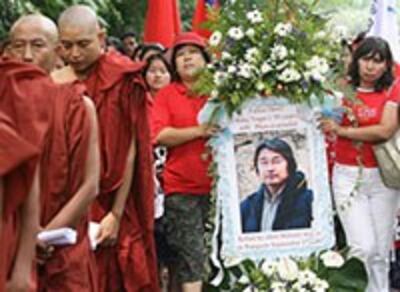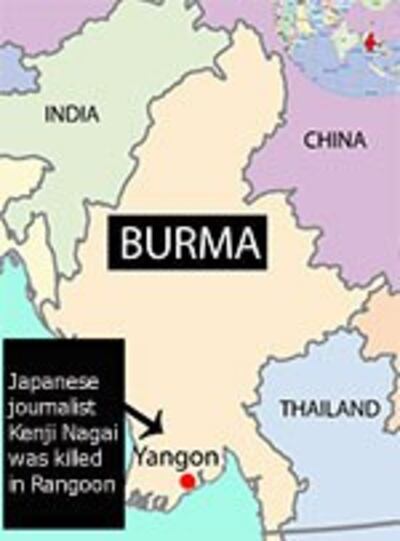
TOKYO—The Japanese news agency whose reporter was shot dead by Burmese security forces during a bloody crackdown on anti-government protests has lashed out at an official newspaper for its coverage of his death.
Toru Yamaji, head of the Tokyo-based APF news agency, said his agency was considering suing the junta's New Light of Myanmar newspaper for insulting Nagai Kenji's professionalism in an article on the Sept. 27 shooting that killed him.
“The piece really was a big insult to Kenji's journalistic integrity,” Yamaji told RFA's Burmese service. “Nagai Kenji followed the Burmese democratic movement with great interest since 1997 up until his death. He had watched the movement with great admiration.”
“He wanted to get news stories and tell the world how the Burmese people are actually suffering and coping with their lives in a country where the Japanese government had given a huge amount of assistance.”
Yamaji also slammed the article for implying that Kenji was killed accidentally by a bullet fired about 30 meters away into a crowd, and for saying he brought his death on himself by entering the country illegally on a tourist visa.
He wanted to get news stories and tell the world how the Burmese people are actually suffering.
Point-blank range
“It was very obvious that the security man close by had killed him. Japanese criminologists as well as journalists had examined him,” Yamaji said. “The bullet was fired from about a meter away. When I went to Rangoon to see his body, the Burmese surgeon did not say anything about the distance from which the shot was fired.”
“Burmese police officials at that time said the shot could have been fired from at least a meter or possibly from a little more than a meter,” he said.
The article also explained Kenji's missing camera by alleging that he failed to declare it in his customs declaration form at Rangoon's Mingaladon Airport, and that no camera had been found on him on entry to the country.
Asked if the camera was non-existent, Yamaji said it was seen very clearly in the picture taken by Reuters, and that APF had records from witnesses who saw him taking video of the demonstration saying that Kenji held a Sony camera at the time he died.
“This video and the tape have images for which he paid dearly with his life, and that's why we wanted to have them back,” the APF chief said.
The official newspaper also quoted a Japanese weekly magazine as saying that Kenji had no interest in Burma's democracy movement, and knew little about it.
“There are still books and documents on Burma on Mr. Kenji's table in the APF office in Tokyo and if they want they can come and see it for themselves," Yamaji said.
Junta 'hounds' journalists

The article, bylined Kyaw Min Lu, accused Yamaji of using his position to send Kenji into Burma.
"Kenji and I had talked about the trip on the telephone, and Kenji felt the protests for the democratic struggle would gradually grow to huge proportions and it would be a good opportunity to tell the world about the true situation in Burma,” Yamaji told RFA reporter Nyan Win Aung."So I gave him permission to go," he added.
Overseas press freedom groups say Burma's military government has "constantly hounded" Burma's journalists during the past three months.
Reporters Without Borders and the Burma Media Association said in a joint statement that the police and army have continued to hunt for journalists and activists who photographed and filmed the crackdown on the pro-democracy demonstrations.
At least nine have had to flee to Thailand. The privately owned media have resumed publishing but the Censorship Board has stepped up its control, they said in a statement.
"The impression that things are back to normal is false," the two organizations said. "We call for an end to the intimidation of the press and for the release of the six journalists currently held. The international community must find a way to get U.N. special rapporteur Sergio Pinheiro's recommendations implemented."
The U.N. Human Rights Council adopted a resolution on Burma Dec. 14 calling on the government to guarantee the freedom of the independent media.
Original reporting in Burmese by Nyan Win Aung. Translated and edited by Khin Maung Nyane. Burmese service director: Nancy Shwe. Written in English by Luisetta Mudie and produced by Sarah Jackson-Han.
